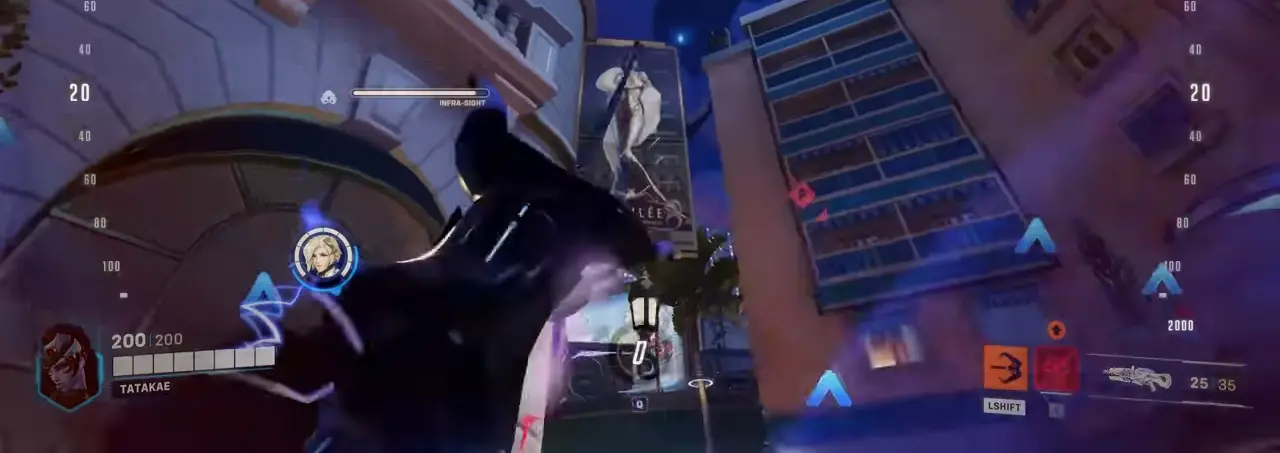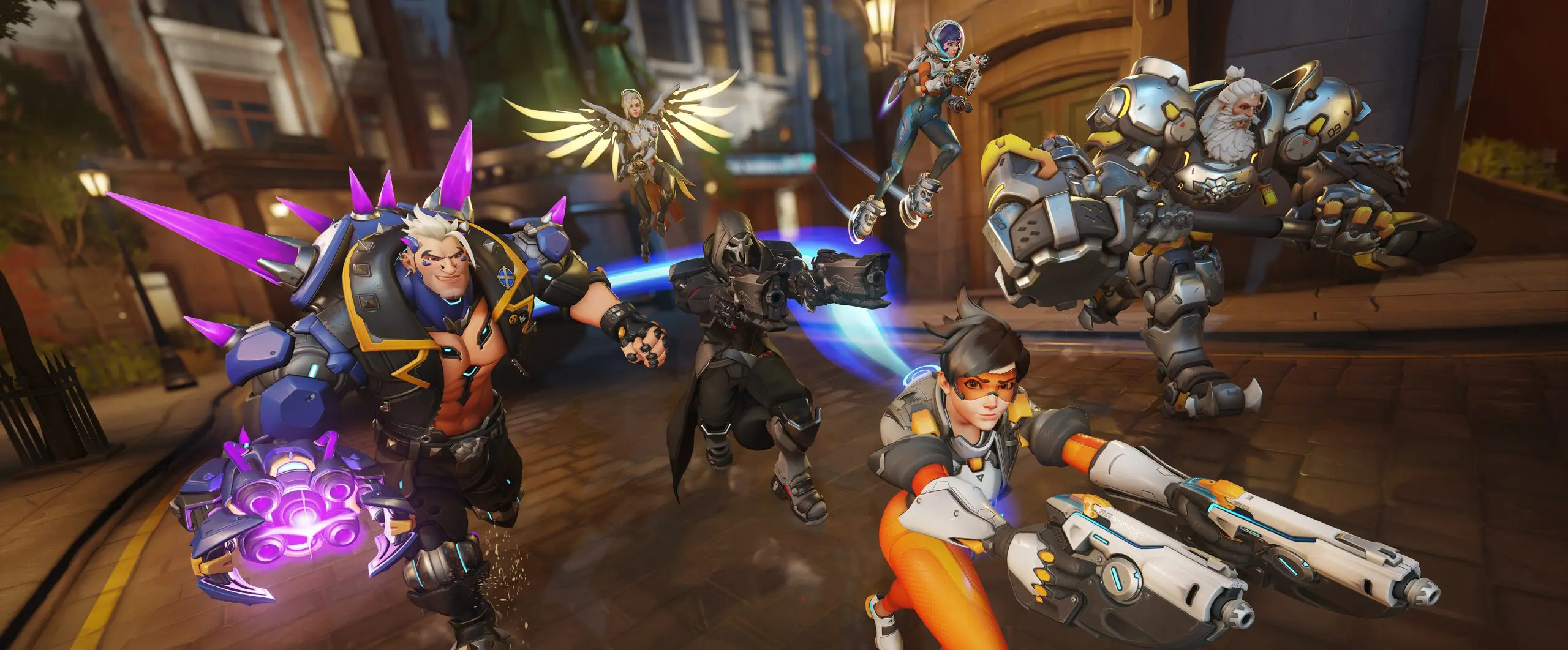In Overwatch 2, how you feel affects how you play. Even the top performers can digress into a concentration deficit when feeling angry or annoyed. That phenomenon is called tilt. It can best be described as a semi-dissociative state overpowered by emotions and leading to a distorted cognitive process.
Making the right decisions becomes foreign when players are tilted. Moreover, pushing objectives could take the place of paying attention to the team. Furthermore, fundamental skill based tasks, such as simple shooting, can also be neglected. All of those actions increase the probability of defeat. Remaining calm, not tilted, is the source of good results.
Alternatively, if you are good with aiming and map knowledge, your rank will not elevate at a significant pace without a strong tilt-free mindset. Mentally being in control of a gamer’s mindset helps in coordination, adapting to dynamic turns of the game, and overall chaos.
Anger, blaming other teammates, trying, or exhibiting abnormal performance are some signs of tilt. Early identification of a concept such as this avoids the spiral towards a ruined match.
Calibrated mentality is just as important as the aiming exercises. Furthermore, enhancing enjoyment alongside scaling the rank can be accomplished by mentally tuning the game – preparation to the focus mastery is an all-no effort restriction reward conditional statement.
What Makes You Tilt in Overwatch 2 and Why It Happens
Tilt in Overwatch 2 can begin for many reasons. One major reason is losing numerous times consecutively. When you drop in rank, it is common to feel angry or hopeless. This causes you to lose focus.
Rude teammates or toxic also increase the burden. Blame games or angry messages can put you in a low mood. Even the best players make mistakes and in crucial skirmishes, the consequences can be more devastating than one would expect. This is especially true if you fail to execute an ultimate combo, bad plays tend to result in instant tilts.
Tougher opponents lead to heightened expectations which can trigger anxiety. You might end up panicking, getting frozen, or going too hard in order to prove your worth, all of which lead to added blunders. You depend on others during battles. Without adequate support, It is common to feel lost, forcing you to perform miserably, which is irritating.
The game metamorphoses with every tick of the clock, keeping players locked in a never-ending cycle of adapting. Instead of enduring endless pressure, trying out different styles and heroes allows you to keep calm.
Identifying the triggers of tilt is the very first step in combating it. Also, remember that for many people, tilt does not begin with a huge frenzy of emotion. In fact, it can build over time. A small combination of really bad games, suboptimal team coordination, and fatigue can add up. Initially, things seemed fine. But before long, you’re angry, stressed, and in a blaming state, which is not ideal. That’s when mistakes happen most. Recognizing the small signs early can help you stop tilt before it takes over. If you feel your hands shaking, your focus dropping, or your mood changing, take a break. Even five minutes away can reset your mind and help you come back stronger.
Easy Ways to Stay Calm and Avoid Tilt in Overwatch 2
A clear mind before the game begins can do wonders. It almost serves as a mental and physical warm-up. Below are a couple of tips you can follow before entering into matches.
Get Ready Before the Match Starts
To start with, use the training modes. Try “Aim Trainer” and “Flickshot Warmup.” They’ll get your aim and quick move skills up to speed. Remember, don’t just shoot, but also practice positioning and smart movement. Good warm-ups should be short but focused, and done repeatedly prior to any session. That helps to get the brain in “game mode.” Making your hands faster and eyes sharper. A strong start helps avoid early mistakes, and maintain focus throughout the match.

Use the following for your physical warm-up:
- Trying to track moving targets helps perfect accuracy.
- Cover and peeking practice improves survival.
- Quick deathmatch rounds help sharpen reflexes.
- Different hero usage increases flexibility and preparedness.
- Movement skills, tackle dodging or jumping under pressure.
For a mental warm-up, try “visualization.” It’s quite useful when preparing the mind for victory.
- Close your eyes for a minute and breathe deeply.
- Picture yourself hitting shots, staying alive, and teamwork.
- Smart choices like good positioning, timing, and even ultimates go a long way.
This mental exercise builds confidence. It trains your brain to expect success. You begin the match feeling calm and strong, not nervous or rushed. Pro players use visualization before tournaments — and now you can use it every day. Even if it feels strange at first, the habit makes a difference over time.
Warm-ups are not just for pros. They’re for any player who wants to improve. Start building your own routine, mix physical and mental steps, and get your mind and body ready to climb.
Use Calm Breathing and Positive Thoughts
Take a few minutes to breathe slowly. Try “Box Breathing.” Inhale for 4 seconds, hold for 4, exhale for 4, hold again for 4. This helps calm your nerves and clear your mind.
Even one minute of deep breathing can slow your heart rate. It clears stress and helps you think better. Focusing on it prior to each event can be useful as a routine.
Give yourself some encouragement prior to the forthcoming match, such as: “I am able to remain composed during times of high pressure,” or “I have confidence in my abilities.” Affirmations as simple as these can change your outlook in addition to fighting off unwelcome anxiety.
Positive talk keeps your mind strong. It pushes out fear and brings in focus. Say it out loud or in your head — it really works.
Watch Your Best Moments, Not the Worst
Before big games, watch replays of your best plays. Remember your strong points. This ensures that you can operate with competence. It helps improve your mental state while enabling you to get off to a positive start.
Consider saving clips or highlights of yourself from previous competitions. Make a point to watch them so as to rebuild your confidence after losing a match. It’s a quick way to feel proud of your progress.
Avoid watching bad games right before playing. They can make you doubt yourself. Stay focused on the positive — it’s a small change that makes a big difference.
Negative replays keep bad feelings alive. That can lead to more tilt. It’s better to learn from losses later, not right before a new game.
Staying Calm and Focused During the Match
In Overwatch 2, strategy is just as crucial as your aim. Make sure you are actually improving, not just focusing on winning. Have attainable objectives such as “make it to the next respawn without dying,” or “don’t engage in solo combat.” These objectives aid in honing your skills, even in difficult games. Over time, you will advance as a player.
Always be more mindful of decisions during matches. Ask yourself, “Was that the best spot to fight?” or “Should I have waited for my team?” When you reflect in real-time, you stop bad habits before they get worse.
Use kind words in your head when things go wrong. Instead of saying, “I’m bad,” tell yourself, “I’m learning.” This shift in thinking keeps you calm. It turns mistakes into lessons instead of stress.
Set objectives that are simple to monitor such as “play three clean matches” or “make smart ult calls.” In this manner, you can feel progress regardless of what you lose. Driving progress in how you perform, not just winning, maintains your motivation.
Remain calm when you die in-game or lose a point. Take one deep breath and picture your next good play. This “mental reset” clears your mind. Focus only on the next move, not on the mistake behind you.
Every player makes errors. The strong ones are those who keep their cool and move on. That’s what turns a loss into a learning moment.
How to Reset and Learn After Each Match
In the moment of heated competition, you may be inclined to shift the blame to your teammates for certain shortcomings, but real changes begin when you self-reflect on your own performance. Every mistake should be perceived as an opportunity for self-improvement, or learning. This is also known as a “growth mindset.” Such a mindset enables you to learn from failures instead of being discouraged by them.
- Rewatch tapes of your past matches. Analyze your victories as painstakingly as your defeats. In self-generated evaluation, ask yourself, “What might I alter in my approach for the next attempt?” Employing such methods encourages learning and narrows the concentration towards self-betterment.
- Engage in physical activity when not in-game. For instance, when waiting in queue, participants may choose to stand up, walk, or perform some form of light exercise. Moving one’s body reduces stress and leads to productivity.
- For prolonged play sessions, employ some form of break or timer application. Taking a quick five minute pause during universal play can significantly enhance focus. Trying too many matches consecutively is a surefire way to burn out.
- Discuss matches, exercises and games with friends or teammates. Identify avenues for improvement while sharing what could make the experience better. Unlike you, those that are better at the game should serve as windows to alternative perspectives that the player could utilize.
Join friendly teams or online groups. That way, you don’t feel alone when games go badly. Support from others can lift your mood and keep you motivated to keep playing.
How to Build a Strong Mindset for the Long Run in Overwatch 2
Winning a single match brings satisfaction. However, remaining composed over a series of games is a much greater challenge. This is the reason why one needs sustained mental power. Here is how to develop it, step-by-step.
Know Your Own Playstyle and Work on Weak Points
Every player has strengths and weaknesses. The first step is to be honest about yourself. Maybe you rush too fast, miss shots when under pressure, or tilt after one loss. That’s normal. What matters is that you notice and work on it.
Take time to look at what you struggle with. Is it understanding the map? Positioning? Changing heroes? Solve your issue step-by-step. Make a list of what you would like to work on first, because identifying the problem is always the first step toward improvement.
Also, try different roles and new heroes. Doing so gives you a different perspective of the game. If you typically maintain a damage role, give support or tank a shot. Mastering multiple positions makes you more intelligent and adaptable in all encounters.
Switching approaches according to changes in the game is essential. Perhaps, your normal strategy isn’t effective this time. Try to adjust your game plan on the fly and embrace unfamiliar tactics. That’s a big part of long-term growth.
Create a Positive Space to Play
Overwatch 2 can be intense, but you control your space. Play with friends if you can. Friendly voices make games more fun and lower your stress. Even if you lose, you’ll feel better with people you enjoy playing with.
If you’re in a match with rude or toxic players, mute chat or turn off voice. It’s not weak — it’s smart. Protecting your peace helps you focus and avoid tilt. You don’t have to listen to negative words that bring you down.
Set limits on how long you play ranked. Competitive matches take a lot of energy. If you play too many in a row, you may burn out. Try this: stop after three wins or two losses in a row. Rest helps your mind stay sharp.
Use breaks to do something offline. Stretch, drink water, or step outside. A clear mind performs better in every game. A healthy body also helps a focused brain.
Train Your Mind Like You Train Your Aim
Mental skills can be trained just like game skills:
- Mindfulness is a great tool. It refers to fully engaging with the present moment. You can start by trying to sit still while focusing on your breathing for two minutes. Take note of the breath going in and out. Clear your mind of all distractions.
- Another option is simple meditation. Close your eyes and focus on counting your breaths. In case your focus drifts away, try to guide it back. Performing this on a daily basis greatly helps with creating a calm center of focus for game scenarios.
- Use mental techniques to help maintain your cool. A great example is the so-called “reverse countdown”. Whenever you feel stress building up, start counting backward from 5 to 1. Release a breath every time you count. This helps reorganize brain functions and stave off panic.
- Maintain a self reflection notebook or a notes app. After every practice, make a note of one thing that you did successfully and one thing to improve on. This teaches effective habit formation and demonstrates progress over time.
Long-term success in Overwatch 2 isn’t just about aim or stats. It’s about mental control. By knowing your playstyle, building a calm space, and training your mind, you’ll win more — and enjoy the game more too.
How to Turn Losses Into Lessons That Make You Better

Every Overwatch 2 player loses sometimes. Every player, regardless of skill, will have a portion of their season that is not up to scratch. The difference here lies in what you do differently after this loss. A good player evaluates the situation.
Avoid moving on and jumping straight into the next game after a loss. Give yourself time. Consider the reasons why you lost and how you can improve for the future. That’s how you grow.
Watch replays if you can. Look at the moment things turned. Did you use your ult too early? Were you out of position? These small details teach you a lot.
Focus on the things you can change. You can’t control your teammates, but you can fix your own habits. This mindset keeps you from tilting.
Try writing down one thing to improve after every match. For example: “I need to stay with my team more.” In the next game, work on just that one goal.
Losses can feel bad, but they’re also full of lessons. Use them to become a smarter, stronger player. Over time, this is what helps you climb and win more often.
Staying Mentally Fresh When Playing Long Sessions
Especially on the weekends, playing for hours is effortless. However, marathon gaming sessions can quickly take a toll. Mental exhaustion slows us down, fires us up, and ultimately leads to a much worse tilt.
To circumvent this issue, be sure to structure a routine. Schedule rest sessions for every hour. Use a timer or an alarm. When it goes off, take a pause from the game. Hydrate, stretch your legs, and breathe deeply.
Experiment with the “3-2-1 rule”: Start with three matches, take a two-minute breather afterward, and let one clearly defined goal guide your focus. This helps with refreshing and sustaining focus.
Be sure not to ignore signals from your body. If you’re experiencing tiredness, hunger, or even irritability — hit pause. Your brain functions at optimal levels when the body is happy. A quick snack or short walk can help more than you think.
Sleep is also key. Playing while sleepy is a fast way to tilt. You’ll react slower and make worse decisions. Rested players win more, focus longer, and stay calmer.
Also, diversify your gameplay. Switch to quick play, arcade, or custom games. If competitive mode is feeling too stressful, take a break from the action. There are those moments in every gamer’s life where all we need is a break. A change of pace helps reset your mood and keep gaming fun.
Your objective is to enjoy the game and improve, but that becomes increasingly difficult if you’re exhausted. To reliably keep your performance up, smart breaks need to be taken, along with good habits.
Final Thoughts and How to Keep Getting Better in Overwatch 2
Your mindset is just as important as your aim. Many players focus only on shooting, combos, or rank. But staying calm, focused, and confident is what helps you win more often. Overwatch 2 is not only about mechanics. It’s also about mental control, smart thinking, and strong emotions.
You can have great aim, but if you’re tilted, your decisions suffer. You may overextend, ignore your team, or waste ultimates. That’s why learning how to manage your emotions is so powerful. It helps you play better, even in tough matches.
Mental training is not hard. It just takes practice. Start with one small habit: take a deep breath after every death, or say something positive before each match. These simple steps build strong focus over time.
We’ve talked about many ways to stay calm — warming up, setting goals, using breaks, watching your replays, and building a good play environment. These tips are easy to try. You don’t need to be a pro to use them. You just need to care about your growth.
If you take the game seriously, then treat your mental skills like your other skills. Warm up your mind just like you warm up your aim. Reflect after each game, not just on stats, but on how you felt. Stay calm, stay focused, or be rushed and angry. The best players know when to take a break. They also know when to ask for help, and that’s okay. They self-analyze, talk to their friends, and, above all, try to gain new knowledge. You can do it too.
Remember, there are thousands of players like you who suffer from tilt, burnout, or stress. And even having a bad day is okay. What you should continue with is pushing yourself for the next attempt with a different strategy. That’s the path to growing as a champion. To really boost your progress, consider using professional services. Coaching for performance reviews from experts can help a lot. They see your weak spots faster, teach you new ways to improve, and keep you on track.
Services like these are for every skill level. No one expects you to be a top 500 overwatch player. ‘Wanting’ to improve is already a great starting point. With guidance and support, your rank will improve alongside your self-esteem.
You don’t acquire mastery overnight, but you can achieve it with deliberate daily effort coupled with strong mental fortitude. Concentrate on the steps required to get to the “W”, not just the “W” itself. Relish in the process; take pride in the progress you achieve. The ball is in your court now. Using what you’ve learned, you can implement a tip starting today. Before the next game, clear your mind, take a deep breath, and set an intention. Overwatch 2 is not just a game, but rather a game of chess; step by step, you will conquer it, if equipped with the right tools.














